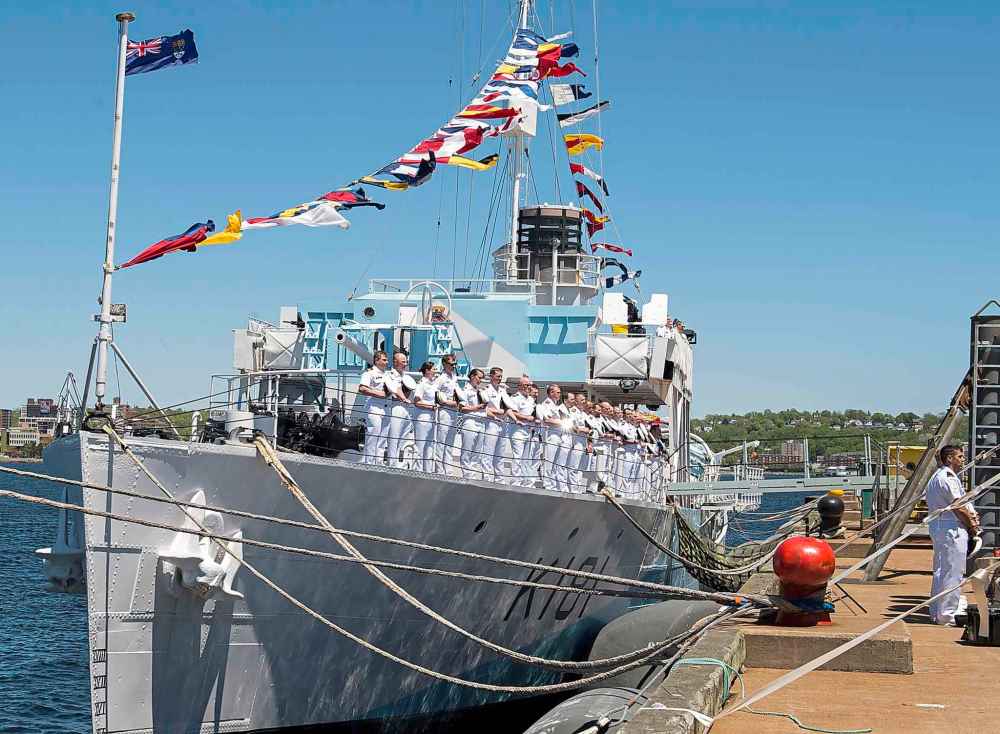Navy steers around shoals of chauvinism
Read this article for free:
or
Already have an account? Log in here »
To continue reading, please subscribe:
Monthly Digital Subscription
$0 for the first 4 weeks*
- Enjoy unlimited reading on winnipegfreepress.com
- Read the E-Edition, our digital replica newspaper
- Access News Break, our award-winning app
- Play interactive puzzles
*No charge for 4 weeks then price increases to the regular rate of $19.00 plus GST every four weeks. Offer available to new and qualified returning subscribers only. Cancel any time.
Monthly Digital Subscription
$4.75/week*
- Enjoy unlimited reading on winnipegfreepress.com
- Read the E-Edition, our digital replica newspaper
- Access News Break, our award-winning app
- Play interactive puzzles
*Billed as $19 plus GST every four weeks. Cancel any time.
To continue reading, please subscribe:
Add Free Press access to your Brandon Sun subscription for only an additional
$1 for the first 4 weeks*
*Your next subscription payment will increase by $1.00 and you will be charged $16.99 plus GST for four weeks. After four weeks, your payment will increase to $23.99 plus GST every four weeks.
Read unlimited articles for free today:
or
Already have an account? Log in here »
Hey there, time traveller!
This article was published 30/07/2020 (1957 days ago), so information in it may no longer be current.
The Royal Canadian Navy is finally sailing in the right direction.
The navy is bravely charting new waters as it moves to deep-six an outdated, sexist title for its most junior members and reflect the fact Canadian society is just over 50 per cent female.
Navies around the world have long used the archaic term “seaman” to describe their junior ranks, with the Royal Canadian Navy using “ordinary seaman,” “able seaman,” “leading seaman” and “master seaman.”
But those biased terms are being sunk in Canada as the navy — in desperate need of hundreds of sailors — plans to replace “seaman” with the gender-neutral rank of “sailor.”
The navy has invited its members and the public to weigh in on the plan, with Friday being the last day for online voting on two alternatives, both of which substitute “sailor” in place of “seaman” in different ways.
It appears the change will move full steam ahead, regardless of the public input. One proposal simply replaces “seaman” with “sailor” in the existing ranks. The other would do away with adjectives such as “able” and “leading” in favour of labels such as “sailor first class” and “sailor second class.”
Whichever option is favoured, change is long overdue. It comes as the military strives to become more reflective of Canadian society, which includes recruiting more women, visible minorities and members of the LGBTTQ+ community, while also cracking down on hateful conduct within its own ranks.
“We appreciate tradition,” Cmdr. Deborah-Lynn Gates, who is responsible for the navy’s personnel policy, told The Canadian Press. “And we’re not downplaying tradition absolutely at all. But it’s truly a matter for us to show that we are progressive and that we are listening and we are really, truly representative of Canadian society.”
“We appreciate tradition. And we’re not downplaying tradition absolutely at all. But it’s truly a matter for us to show that we are progressive and that we are listening and we are really, truly representative of Canadian society.” – Cmdr. Deborah-Lynn Gates
Like cities that are dumping the archaic titles “policeman” and “fireman,” the navy has argued the use of “seaman” has become a barrier to recruitment at a time when the service finds itself short about 850 sailors.
“When they hear you’ll start off as an ordinary seaman, it’s maybe just a little thing, but it did not resonate,” Cmdr. Gates said. “So we know it’s not resonating with recruits and for us it’s a matter of making sure we’re being representative and that we are modern and forward-looking.”
Not surprisingly, the plan is facing some rough seas, including backlash on social media from critics, including active navy personnel, who use the phrase “political correctness” to attack the changing of an unjust status quo.
Angered by some posts earlier this week, Rear-Admiral Chris Sutherland warned on Facebook there is no place in the navy for sailors who subscribe to “hateful, misogynistic and racist” beliefs.
“If you cannot live by or support the values of the Canadian Charter of Rights and Freedoms, then you cannot defend them,” the navy’s deputy commander wrote in a blunt post.

The debate has echoes of the absurd fuss that erupted in 2016 when the House of Commons overwhelmingly voted to make the national anthem gender-neutral by replacing “in all thy sons command” with “in all of us command.”
The move came despite complaints from Conservatives the new lyrics should have been put to the people in a referendum. Later, when MPs rose to sing the gender-neutral version, Tory Leader Andrew Scheer remained seated.
Mr. Scheer later complained “the Liberals were using our national anthem for a political statement.”
Canada’s navy is making a statement, too — that it’s time to realize military jobs are no longer the traditional male bastion they once were.
The change still requires cabinet approval, but one hopes all Canadians will stand and salute as our navy charts a course toward a brighter, more inclusive future.










